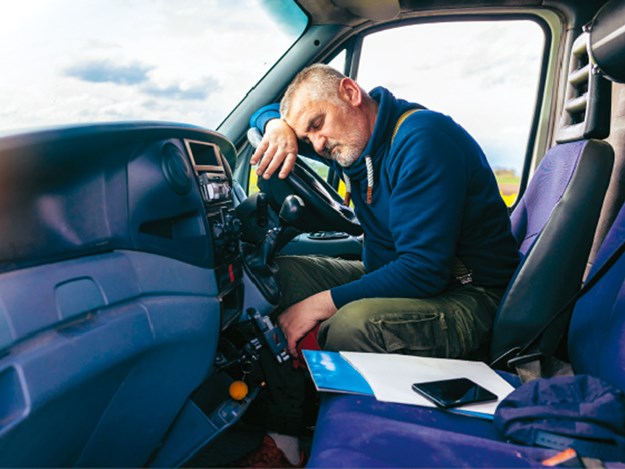Comment: Testing for sleep apnoea
Fatigue poses an elevated risk to an employee’s safety during work and non-work activities and so it's important to report and manage fatigue in your business
Fatigue is a globally recognised hazard for Commercial Transport Operators and so as a PCBU, it would be reasonable to report and manage fatigue in your business.
This is where Fit for Duty and EdenSleep can help.

Fatigue is a common and unavoidable by-product of the 24/7 demands of most industry sectors. Defined as a decreased capacity to perform mental or physical work or the subjective state in which one can no longer perform a task, fatigue manifests in physiological performance decreases and cognitive impairment.
To this end, fatigue poses an elevated risk to an employee’s safety during work and non-work activities. The recognition that sleep disorders are a significant contributing factor to an employee’s excessive daytime sleepiness level, makes screening and treating sleep disorders a reasonable and practicable step to take to mitigate fatigue in the workplace. It’s important to remember that just because you identify employee fatigue (or employees with sleep disorders) and you report these as hazards in your business does not mean you’re going to find yourself in the middle of a Worksafe investigation.
Testing and treating obstructive sleep apnoea
The very nature of being a commercial driver lends itself to a lifestyle that exacerbates the sleep disorder, obstructive sleep apnoea (OSA), and it can result in unnecessary traffic and workplace accidents. In some cases, those accidents have been fatal. We believe the screening and treatment of OSA is a critical part of any fatigue mitigation programme in the 24/7 sector. Therefore, we offer a complete turnkey service for the diagnosis and treatment for OSA in the commercial transport sector.
What is sleep apnoea?
Many people have sleep apnoea and don’t realise it. It’s a serious, potentially life-threatening condition that’s far more common than is generally understood.
It’s a breathing disorder characterised by pauses in breath during sleep and nightly snoring. This restless sleep leaves people feeling ‘dog tired’ (sleepy and exhausted) during the day.
OSA is present when the airway at the back of the throat is repeatedly blocked, partly or completely, during sleep. Snoring, obesity, observed apnoea, and sleepiness in the day may suggest that a person has sleep apnoea. The best way to be sure about an OSA diagnosis is with an overnight sleep study and a clinical assessment by a doctor.
The effect of OSA is that a person can stop breathing for periods of time when asleep. These interruptions (apnoeas), which can last for up to 10 seconds or more, occur when the airway narrows so much that it closes. This stops breathing, and the brain reacts by briefly waking the subject, causing the airways to re-open and breathing to restart. The individual may not be aware of this, and the process can be repeated up to several hundred times during the night. Proper sleep becomes impossible, resulting in sleepiness and impairment of daytime (work-time) function. Stimulants (such as coffee) taken to counter the effects of tiredness are not a substitute for sleep. The regular use of stimulants by individuals may be a clue to the existence of an underlying sleep disorder.
Why do we need to treat OSA?
Due to interrupted sleep patterns, OSA suffers rarely have restorative rest, manifesting in some of the following problems:
- 40% increase in excessive daytime sleepiness
- Twice as many traffic accidents per kilometre
- Threefold risk of occupational accidents
- 1.3 to 2.5 times more hypertension
- 2.2 times increased risk of nocturnal cardiac arrhythmia
- 3 times more likely to have congestive heart failure
- 1.4 to 2.3 times greater risk of heart attack
- 40% increased risk of depression
- Australian research has shown that up to 41% of commercial drivers are likely to have obstructive sleep apnoea
Fit for Duty and EdenSleep programmes
The purpose of offering an overnight sleep study may assist in identifying individuals who have a risk or think they may have OSA. Individuals who may benefit from this programme include:
- Those who think they have a problem with their sleep and would like a formal diagnosis
- Those who are ‘red flags’ in the business i.e. have high accident and incident rates, high absenteeism, presenting with excessive sleepiness, micro-sleep/fatigue-related driving incident
- All drivers as part of LTSC members’ pre-employment medicals and ongoing occupational health monitoring efforts
Please contact us at LTSC to discuss further support and fee schedule admin@logtruck.co.nz or Emma Godwin, sector administrator manager 027 864 2809 or Fit for Duty Ltd 0800 627 763 or fitforduty.co.nz.
Keep up to date in the industry by signing up to Deals on Wheels' free newsletter or liking us on Facebook.





.jpg)


.jpg)




.gif)
.gif)
.jpg)

